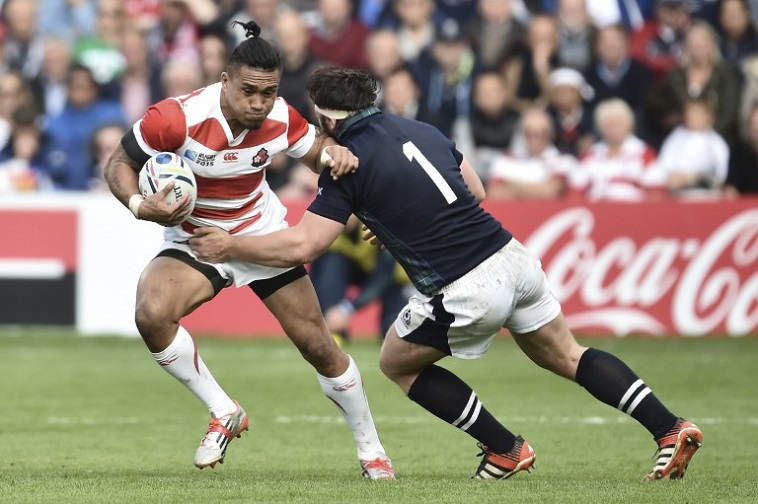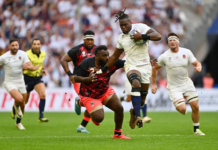After their fairytale debut in the 2015 edition of the Rugby World Cup, Japan’s dreams of another favoured scalp were thwarted by a late Scottish charge on Wednesday.
The game against the Scots should ideally have been a run-of-the-mill warm up for the Thistles but ended up being game eagerly anticipated by Japan’s leapfrogging of Scotland in the rankings in the leadup.
The pressure on Scotland not to succumb on skipper Greg Laidlaw’s home ground of Kingsholm was immense. As it was on Vern Cotter not to allow the Japanese momentum to upset his side. It was going to be, judging by all aspects, a nail biting game.
Except that Japan had only 3 days off since their Springbok hunt. Any person watching the anthems would realise who’s going to come off worse in a physical confrontation between the South African giants and Japans Asians – well most of them anyway. Usually, a Saturday game would lead to immediate ice baths, injury assessments and video analysis in the next day or so, accompanied by light stretching or complete rest, and a return to gradual training on Monday.
As it happened, Japan had to travel from Brighton to Gloucester, recover from a battering dished out by one of the biggest, most physical teams in world rugby, recover and be fit enough to play a fresh Scotland on Wednesday. This meant that they had 72 hours off with traveling taking an additional toll, and having to set up in new digs.
The game ended 45-10 in favour of Scotland. Given Japan’s recovery time woes, the lack of a surprise element and also Scotland’s determination and preparation, it is hard to imagine the game would have been otherwise. However, it is important to note that the glut of those points came in the latter part of the game, after the game’s best player Amanaki Mafi went off injured, seemingly with a hamstring injury which is indicative of the lack of rest and recovery.
Mafi’s departure in the 45th minute led Japan extending their lead by 5 points from the 12 – 10 position they were in just after the half. When Yamashita, who had been pinged a few times by referee Lacey went off after that, it was the next try that broke the back of the Japanese. For me, looking at the still frames, it is beyond a doubt that Mark Bennet stepped over the dead ball line in grounding the ball. At 17 – 10 and one score in it, the pressure was on. The referee’s refusal to even have a cursory glance at the line decision was compounded by Laidlaw’s haste to bang over the conversion from in front of the posts before anyone got any ideas.
Anyone who follows rugby with any discernment knows that games are won in moments. Not over a half or over two halves. Absorption of pressure and winning crucial micro contests result in victory. If John Lacey had been competent, let alone good, in the awarding of Bennet’s try, Japan may still have been in the game.
Furthermore, before Mafi went off, he tried an irregular dive over the top of a heap of bodies in order to touch the ball down. Scotland caught him literally on top of the pile, held him up and drove him back. Lacey called ‘maul’ and awarded the ball to Scotland under the sticks whereby Denton was able to run it into safety. Mafi was held up clearly over the try line. There was no maul because Mafi was not on his feet, and no other Japanese player was bound on, to constitute the maul. The referee was right in front of it. The call should have been ‘held up’ with a scrum five to the Japanese who may quite well have scored from the resulting pressure. Instead this crucial call was botched by an official who can euphemistically say had a bad day, or whose mum had called him to say that she’d bet his inheritance on Scotland.
The yellow carding of Matsushima earlier in the first half was another howler that could only raise the eyebrows of Japanese fans. The Brave Blossoms winger stopped the Scotland ball carrier in his tracks and ripped the ball backwards from his grasp before a ruck was formed, and even before the ball carrier hit the deck. It was not a yellow card, nor was it a penalty. A review would have made that blatantly obvious but Lacey was confident in his cluelessness. So confident he even overruled the touch judge from 40m when Goramaru’s touch kick – which led to Japan’s first try – was deemed to be touch in goal. Perhaps he was embarrassed by the obviousness of the partiality towards Scotland that he felt it necessary to make such an unusual call.
Sterling cover defence by Goramaru kept Scotland out with 14 men, but they were stretched and after the hour mark at which point the crucial Bennett try came, the Japanese dam was about to burst. And it did. Scotland went from 22 – 45 in 20 minutes, with the Japanese legs tiring. To add salt to the wound, Tommy Seymour scored an intercept try – which was perfectly legal – but was born of a Scottish defence that flirted with the hindmost foot all day to no censure.
A team that made no offloads against South Africa, were rushed into forcing inaccurate passes. Yes, Japan were less disciplined than they were against South Africa, but they were clearly rattled by Lacey’s calls. In the first half Yamashita was penalised for ‘hinging’, but an examination of the collapsed front row clearly shows the Scottish prop bent almost like a capital A, while the penalised Japanese prop was on the ground with his back almost straight. A ‘hinge’ is where a prop bends downwards to induce his opposite number to lose either his footing or his bind. It’s apparent from the body position who has done this first. Clearly, Lacey had no clue about that either – although he did get a couple of scrum penalties right.
In terms of perspective Japan made 5 more attacking metres than Scotland did. They crossed the gainline 59 times to Scotlands 35 times. Mafi made 90 metres with the ball in hand in 45 minutes while Tommy Seymore carried for 83 metres – 75 of which came from one run. Scotland were forced to make 197 tackles to Japan’s 111. The telling stat was the turnovers won in open play where Scotland led 7 to 5 in the attacking half.
Japan had 60% possession and 64% territory. Teams have lost with those commanding stats. But not 45-10. That is unusual. Very, very unusual.
What is most disconcerting is that neither the commentators or the largely British press is questioning Lacey’s decisions. Not so much as a shred of accountability for such a poor performance which may well have denied one of the great minnow performances. Eddie Jones has not brought it up because he has Samoa to worry about. But someone should. The smaller nations deserve some respect, and a level playing field. If England were on the wrong end of some of those calls I’d hate to see the reaction. Because it’s Japan – against the home nation in danger of quitting the Union – we’ll all keep mum. It’s upsetting. It’s not rugby. It reeks of cricket.























